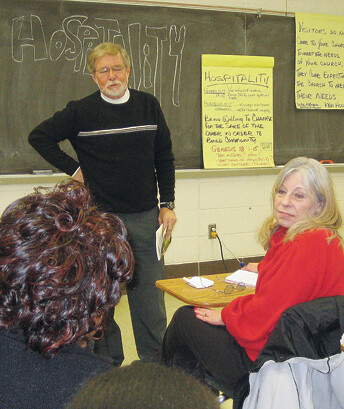
Academy grows disciples
UMCONNECTION STAFF
Nearly 1,000 church leaders gathered in four locations throughout the conference for a one-day leadership training Feb. 7.
 "We're here because our lives have been transformed by God in some way," the Rev. David Argo said as he addressed the 250 people gathered at Eleanor Roosevelt High School in Greenbelt.
"We're here because our lives have been transformed by God in some way," the Rev. David Argo said as he addressed the 250 people gathered at Eleanor Roosevelt High School in Greenbelt.
"We're gathered here as leaders so we can better serve, not just those already in the church, but those who are not yet in the church."
. In addition to the Washington Region, simultaneous sessions were held at Trinity UMC in Prince Frederick, Western High School in Baltimore and Linthicum Heights UMC in Linthicum. In the Western Region, the training was offered at three locations: Sandy Mount UMC in Finksburg, Calvary UMC in Martinsburg, W. Va., and Centre Street UMC in Cumberland.
"People asked for Leadership Days," said the Rev. Louis Shockley, the event's dean. "We got the message that people want regional training. We're seeing a great result."
In each location, participants could take two classes, one in the morning and one in the afternoon among those offered on Staff Parish Relations, Finance, Hospitality, Trustees and Church Council. In addition Gateway training on the conference's data base system was offered at each site.
About 30 staff-parish relations committee leaders listened as the Rev. Vivian McCarthy explained the role of the SPRC as defined in the Book of Discipline. "One of your jobs is to help pastors and staff reflect on their gifts for ministry," she said. "That may mean helping the pastor to improve on what needs improvement. ... God has gifted all members of the body (and) we need to use those gifts."
Hospitality was a big theme this year, not just in the specific class, but throughout other classes and events.
Many people in the class led by the Rev. David Carter-Rimbach, a Guide in the Washington Region, shared success stories of how they welcomed people to their churches. A sign in the front of the room reminded attendees: "Visitors do not come to your church to meet the needs of your church. They come expecting the church to meet their needs."
"The Church Council is not just nuts and bolts, it's about making disciples."" said the Rev. Rodney Smothers, in another class.
In a classroom packed with 40 people, Smothers stretched the concept of church council to look beyond their own local church to a wider community, especially when it comes to resources. "We've got to share resources and talk to one another," he said. That applies to within the church as well as beyond the church to within the community.
The church council class also dealt with stewardship, "If you as the church council are not taking the lead in giving (in your church), the church won't give either," he said.
The Rev. David Argo, leading the class on finance, explained and emphasized the payment of apportionments.
"We need to have congregations recognize that paying apportionments transforms lives," he said. He illustrated by saying that 1,000 young people came to an altar call at ROCK 2009, paid for in part by the apportionments. Who knows how their lives will be changed as a result of that action, he asked.
Members in the group raised many questions about church budgets. Argo encouraged them to develop realistic budgets "so on paper you're not always behind."
Budget is a reflection of ministry, he said. "Finance is in the prime place to say how does this budget meet the vision and mission of the church."
Money for the operating budget "should come from tithes and offerings," Argo said, and not from endowment funds. Because of the economy today, in which endowment funds and their subsequent earnings are shrinking drastically, he said that two Washington area churches no longer have funds on which to operate, pay salaries or utilities.
The basis for budgeting - and for giving - in the church needs to be spiritual, Argo said. Spiritual giving and percentage-based budgeting, rather than needs-giving or needs-based budgeting (the usual approach) is a very different approach to the matter of money in the church, Argo said."If I realize what God has done for me, I can't give enough."
Leadership Days has given church leaders "a sense they're empowered," Shockley said. "It will make a difference to the local church."
Login/Register to leave comment